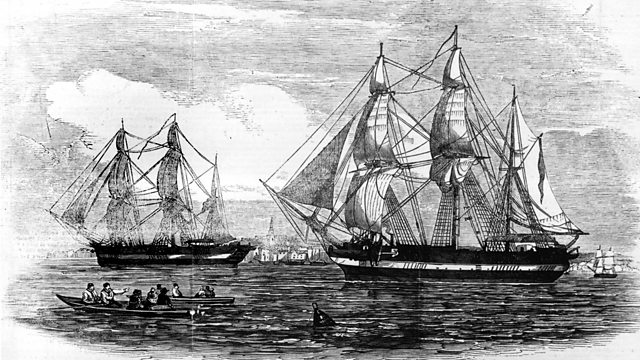
Concerning Franklin and His Gallant Crew
Through a traditional song, Julian May explores the fate of Lord Franklin and his crew on their voyage in search of the Northwest Passage.
It was on this day, 20th May in 1845, that Lord Franklin's ships the Erebus and Terror cleared the mouth of the Thames on their voyage to find the Northwest Passage. A traditional song recounts the story 'of Franklin and his gallant crew' and through this Julian May explores Franklin's fateful, indeed fatal, voyage, and reveals how folk song, as well as beautiful and inspiring, can be history.
"With a hundred seamen he sailed away
To the frozen ocean in the month of May
To seek that passage around the pole
Where we poor sailors do sometimes go."
The ships were lost (the wrecks are still to be located) - with all hands.They were locked in the Arctic ice. Eventually the crew abandoned them and headed overland to Great Slave Lake, almost 1,000 miles away. They all perished on the journey; before they died they resorted to cannibalism.
"Through cruel hardship his men did go
His ship on mountains of ice was drove
Where the Eskimo in his skin canoe
Was the only one who ever came through."
Recent discoveries have revealed that they may have been early victims of modern food packaging. Franklin's expedition was the first to rely on tinned food and it appears their supplies were shoddily manufactured and sealed with lead solder, which poisoned them. The French navigator, Aubert Bellot, set out in search of Franklin, and disappeared too. Lady Franklin also paid for an expedition to search for her husband, but that failed and what really happens remains a mystery.
"And now my burden it gives me pain
For my long lost Franklin I'd cross the main
Ten thousand pounds would I freely give
To know on earth that my Franklin do live."
Julian May's interest was kindled when he heard someone singing the song which tells the story with extraordinary vividness and accuracy. He went on to research both the history and the song itself. The narrator is aboard a ship and dreams 'concerning Franklin and his gallant crew'. Some think the author was Lady Franklin herself. The song is sung by many people - for instance England's foremost folk musician, Martin Carthy - and it has inspired artists in other disciplines, such as Michael Donaghy, who incorporates it in a poem.
On the anniversary of their setting sail Julian May traces story of Franklin and his gallant crew story through the song, via Greenwich, where there is a monument to Bellot, the National Maritime Museum, which recently mounted an exhibition about the Northwest passage that included items recovered from Franklin's expedition, and an interview with Martin Carthy, who sang the song that so intrigued him.
"In Baffin bay where the whale-fish blow
The fate of Franklin, no man may know;
The fate of Franklin, no tongue may tell,
Where Franklin along with his sailors does dwell."
Produced and presented by Julian May.
Last on
More episodes
Previous
Next
Broadcast
- Thu 20 May 2010 19:50大象传媒 Radio 3
